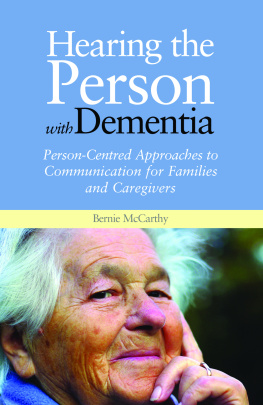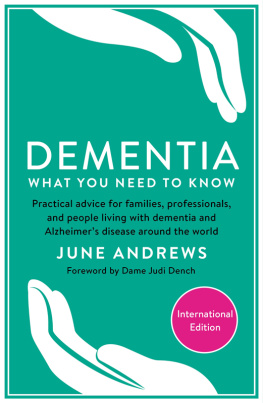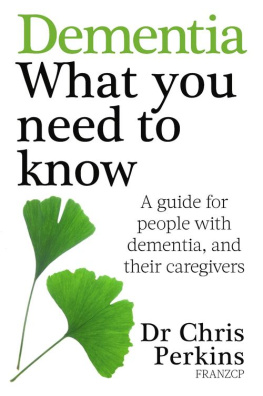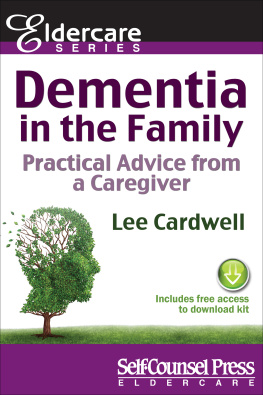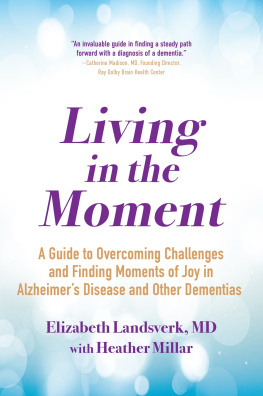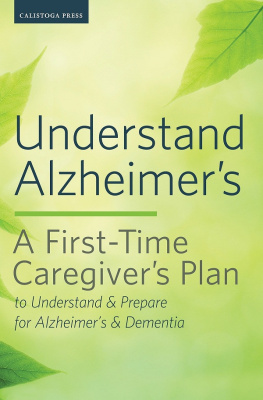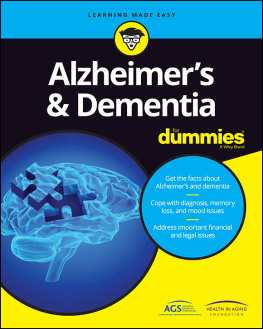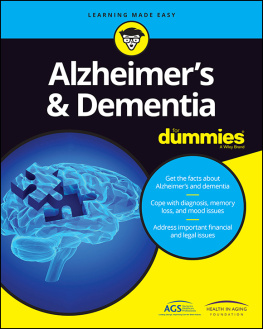Sexuality and Dementia
Also by Douglas Wornell, MD
Wandering Explorers: Practical Dementia for Families and Caregivers
Sexuality and Dementia
Compassionate and Practical Strategies
for Dealing with Unexpected
or Inappropriate Behaviors
DOUGLAS WORNELL, MD

Visit our website at www.demoshealth.com
ISBN: 978-1-936303-55-7
e-book ISBN: 978-1-61705-190-6
Acquisitions Editor: Julia Pastore
Compositor: diacriTech
2014 by Douglas Wornell. All rights reserved. This book is protected by copyright. No part of it may be reproduced, stored in a retrieval system, or transmitted in any form or by any means, electronic, mechanical, photocopying, recording, or otherwise, without the prior written permission of the publisher.
Medical information provided by Demos Health, in the absence of a visit with a health care professional, must be considered as an educational service only. This book is not designed to replace a physicians independent judgment about the appropriateness or risks of a procedure or therapy for a given patient. Our purpose is to provide you with information that will help you make your own health care decisions.
The information and opinions provided here are believed to be accurate and sound, based on the best judgment available to the authors, editors, and publisher, but readers who fail to consult appropriate health authorities assume the risk of injuries. The publisher is not responsible for errors or omissions. The editors and publisher welcome any reader to report to the publisher any discrepancies or inaccuracies noticed.
Library of Congress Cataloging-in-Publication Data
Wornell, Douglas.
Sexuality and dementia : compassionate and practical strategies for dealing with unexpected or inappropriate behaviors / Douglas Wornell, MD.
pages cm
Includes bibliographical references and index.
ISBN 978-1-936303-55-7 (alk. paper)
1. DementiaPatientsSexual behavior. I. Title.
RC521.W67 2014
616.83dc23
2013034850
Special discounts on bulk quantities of Demos Health books are available to corporations, professional associations, pharmaceutical companies, health care organizations, and other qualifying groups. For details, please contact:
Special Sales Department
Demos Medical Publishing, LLC
11 West 42nd Street, 15th Floor
New York, NY 10036
Phone: 800-532-8663 or 212-683-0072
Fax: 212-941-7842
E-mail:
Printed in the United States of America by McNaughton & Gunn
13 14 15 16 17 / 5 4 3 2 1
For Bird
Contents
Preface
IS IT SEXOR SOMETHING ELSE?
A recurring topic in my conversations with families and caregivers is whether or not we are actually talking about sexual activity when people with dementia reach out to one another, or to others. Sex is by definition a mix of emotion and physiology. That is, sexual thoughts and interest are followed by bodily arousal and ultimately sexual activity. Yet we are not neurobiological experiments walking around. Our sexual psychology and physical reactions vary and are often cloaked by several other factors such as culture, the current social situation, and life experience. At times this uncertainty of what another might be feeling sexually adds to the excitement. At other times it results in fear. It is at the core of receiving flirtation, for example, to try and decipher whether or not someone is interested and hinting sexually or just making some other, less intimate, contact. And then there are other situations, such as in the case of perversion or stalking, where the excitement is replaced by a very negative creepy feeling.
So what about our reaction to those with dementia, hidden sexually in a world of confusion? We know that dementia in general diminishes sexual behavior. Theres just less brain, less testosterone, less everything to get things going. Yet we also know that social inhibitions falter, that psychosis and paranoia create chaos in relationships, that certain medications or lesions may actually lead to an increase in sexual activity in dementia patients, and that partners are left devastated and trying to deal with their own emotions. Still, thats not the whole story. There is something missing here, something big and unclear. What about the people with advancing neurological disease who are transitioning downwards, memory by memory, ability by ability, who still have some need to touch, to hug, to kiss? Yes, some may be openly flirtatious and others perverse, but the majority just seem to be what we might imagine ourselves to be if in their shoes. Are they feeling sexual? Or are they lonely, locked away in a disease, living in their past and far away from their present? Just wanting to connect...somehow, with someone? That is the something else. The something big.
Behavior can be interpreted in as many different ways as there are individuals observing it. What a spouse interprets as tenderness, a caregiver may view as overtly sexual. What one facility determines is acceptable touch, another may censure. What might be labeled as just the need to touch by a doctor might still be very sexual to the long-time romantic partner. What follows are many stories of patients and caregivers and spouseseach with their own needs and interpretations. Hopefully, these will be of benefit to others navigating this experience.
PART ONE
A Different View of Sexual Behavior
CHAPTER ONE
An Unexpected Symptom: A Very Common Occurrence
The first time I met with Kate and John, a silver-haired and healthy-looking couple in their early 70s, I was not surprised by the story Kate told me. John, big and bearish but gentle, who had been diagnosed with dementia several months before, was a retired OB-GYN. Kate, a petite live wire, was clearly worried about him. Exhausted, she sat by her husbands side. Both of them look dazed and confused, angry and frightened. It only took a glance into their eyes to see that this was not where they wanted to be. Once I walked in, Kate took me aside.
I dont know how to say this, she began, so Ill just come out with it. Theres something that happens, something that scares me, and I dont know what to do about it. You see, I thought that our sex life was over. I was fine with that. I thought we both were. But John has become very aggressive about wanting to have sex. Honestly, I dont know how I feel about this. Is it normal? Is his conditionor his medicationmaking him behave this way? Am I wrong to give in or should I resist? Please, can you help me?
In another session, this time involving a couple in their 60s, Tom, lean and tanned, who ran a very successful business, told me about his wife Joan who had Alzheimers. Joan, in a designer outfit and with perfectly coiffed hair and manicured nails, gave off a glamorous air.
Shes been a flirt all our married life, but I was never concerned. I knew it was harmless, he told me, but now she has become practically predatory, targeting potential sexual conquests wherever she can find them. We went to my 40th college reunion, which I thought was okay because she is mildly sedated. I couldnt believe it; as soon as we got there, Joan was off my arm and sitting in various laps. There was no controlling her. I was beyond embarrassed. I literally had to drag her to our room and lock her in. We left early the next morning. I havent been able to face my old friends since. More importantly, what am I going to do? How can I help Joanif she can be helped at all?


